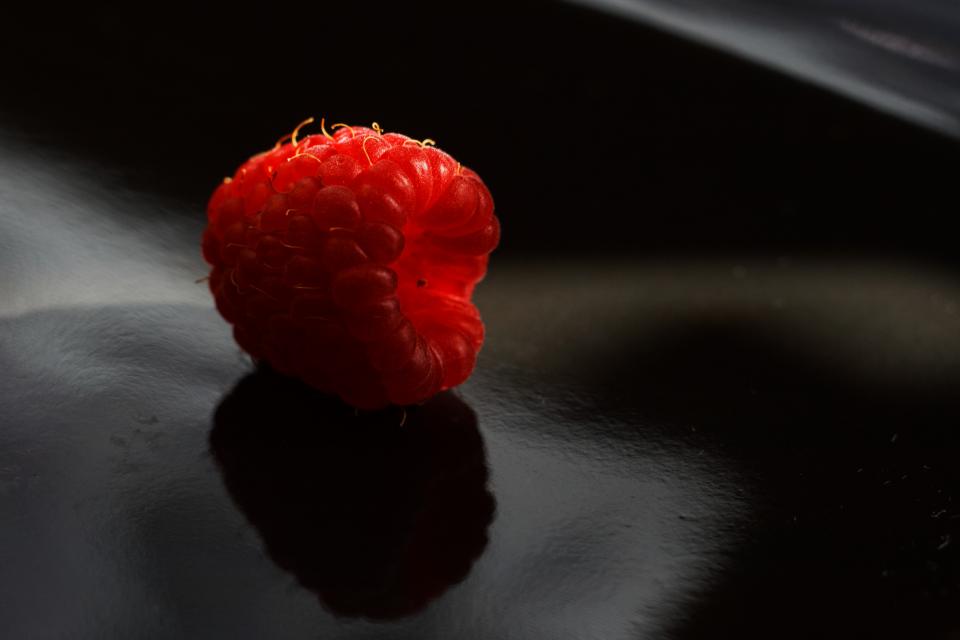Ah, raspberries. Those little red jewels of summer, bursting with flavour and juiciness. We humans adore them, but can our furry friends enjoy them too? The answer is a resounding yes, but like with any treat, there's a bit more to it than just popping a handful into your dog's bowl.
As a dog owner myself, I'm always looking for ways to make my little terrier, Pip, happy. He's a bit of a foodie, always keen to try new things (sometimes even things he shouldn't!), so I'm constantly on the lookout for healthy and tasty snacks to keep him engaged. And let's be honest, who doesn't love a juicy raspberry?
So, let's delve into the world of raspberries and dogs. We'll uncover the benefits of these little gems for your furry friend, the potential risks you should be aware of, and the golden rule of how much is too much. And of course, we'll answer all those burning questions you might have about raspberries and your dog – think of me as your personal raspberry expert!
Part 1: The Sweet and Healthy Benefits of Raspberries for Dogs

The good news is, raspberries are packed with nutrients that can do wonders for your dog's health. They're not just a tasty treat, they're a little nutritional powerhouse!
1.1. A Vitamin Boost for a Healthy Immune System
Raspberries are a treasure trove of vitamins, especially vitamin C, vitamin K, and vitamin A. Now, you might be thinking, "aren't these vitamins for humans?". Well, they're just as important for our furry friends!
- Vitamin C is like a superhero for your dog's immune system. This potent antioxidant helps fight off infections and keeps your dog's defences strong. It's also vital for healthy skin and bones because it plays a role in collagen production, the building block of connective tissues.
- Vitamin K is crucial for blood clotting, helping prevent excessive bleeding, especially if your dog gets a little too enthusiastic during playtime. It also plays a key role in maintaining strong bones.
- Vitamin A keeps your dog's eyes healthy, supports a robust immune system, and keeps their skin looking smooth and shiny.
So, a handful of raspberries can give your dog a boost of essential vitamins, contributing to their overall well-being.
1.2. Fibre Power for a Happy Tummy
Raspberries are also a fantastic source of dietary fibre. While fibre might not be the most exciting thing, it's essential for healthy digestion. Think of it as a gentle regulator for your dog's digestive system.
- Fibre helps keep things moving smoothly in the digestive tract, preventing constipation and diarrhoea. This means fewer uncomfortable trips to the garden for your dog and fewer worries for you.
- Fibre also promotes a healthy balance of good bacteria in your dog's gut. This is crucial for overall health, contributing to a strong immune system and better digestion.
- If your dog tends to have a sensitive stomach, introducing raspberries into their diet might provide some welcome relief.
1.3. Low-Calorie Treats for Weight Management
One of the best things about raspberries is that they're naturally low in calories. This makes them a guilt-free treat for your dog, especially if you're trying to keep those pounds in check.
Instead of reaching for high-calorie treats, raspberries offer a healthier alternative, allowing you to indulge your dog's sweet tooth without worrying about extra weight.
Part 2: The Potential Risks to be Mindful Of

Okay, so raspberries seem like a win-win, but as with anything, there are a few potential risks to keep in mind.
2.1. The Sugar Factor: Moderation is Key!
While raspberries are a healthier choice compared to other sugary treats, they do contain natural sugars. It's important to be mindful of this, especially for dogs with diabetes or other health conditions.
Overfeeding raspberries can lead to weight gain, so moderation is crucial.
2.2. Seeds and Stems: Potential Choking Hazards
The seeds and stems of raspberries can be a choking hazard, especially for smaller dogs. It's essential to remove them before offering raspberries to your furry friend.
If your dog has trouble swallowing, it's a good idea to mash the raspberries or cut them into smaller pieces.
2.3. Allergies: A Rare But Possible Concern
As with any new food, there's always a chance your dog might be allergic to raspberries, although it's not very common.
Start with a small amount and observe your dog carefully. If you notice any signs of an allergic reaction, such as itching, swelling, or digestive upset, stop feeding raspberries and consult your vet immediately.
Part 3: Finding the Right Raspberry Dose for Your Dog

So, how many raspberries is too many? Well, there's no magic number. The ideal amount depends on your dog's size, age, and health condition.
The general rule of thumb is to start slowly, offering just a few raspberries and observing their reaction. If they tolerate it well, you can gradually increase the amount.
- Small dogs should start with just one or two raspberries, while larger dogs might be able to handle a few more.
- It's best to offer raspberries as a treat rather than a regular part of their diet.
- Always supervise your dog when they're eating raspberries, making sure they don't gobble down too many at once.
Think of raspberries as a fun bonus, not a staple food item.
Part 4: My Personal Experience with Raspberries and Pip
Now, let's talk about my own little gourmand, Pip. He's always up for trying new things, and thankfully, he's a big fan of raspberries!
I started by giving him a couple of raspberries, and he devoured them with gusto. He seemed to love the sweet taste and the juicy texture. Now, he gets a few raspberries as a treat every now and then, and he's always thrilled to see them coming.
Of course, I always remove the seeds and stems, and I keep a watchful eye to ensure he doesn't overdo it. So far, so good – he's tolerated them perfectly, and his digestion has remained smooth sailing.
I'm glad I discovered a healthy and delicious treat that he enjoys. It's a wonderful way to give him a little something special without worrying about too many calories or potential health risks.
Part 5: Introducing Raspberries to Your Dog: A Step-by-Step Guide
If you're thinking about introducing raspberries to your dog, here's a helpful guide to make the process smooth and safe:
5.1. Start Small and Observe
As mentioned before, start with just a few raspberries and see how your dog reacts. This allows you to assess their tolerance and prevent any potential digestive upset.
5.2. Remove the Seeds and Stems
Always make sure to remove the seeds and stems before offering raspberries. They can be a choking hazard and can also cause digestive problems.
5.3. Choose Fresh Raspberries
Fresh raspberries are the best choice for your dog. Avoid processed raspberries or those with added sugar, as these can be harmful.
5.4. Supervise Your Dog
Always supervise your dog when they're eating raspberries, especially initially. This allows you to monitor for any allergic reactions or digestive issues.
5.5. Consult Your Veterinarian
If you're unsure about feeding raspberries to your dog, or if they have any pre-existing health conditions, it's always best to consult your veterinarian. They can advise you on the appropriate amount and frequency, and can also assess your dog's individual needs.
Part 6: Creative Ways to Serve Raspberries for a Delightful Treat
Just like us, dogs can get bored with the same old treats. Here are a few creative ways to serve raspberries to your dog, making them more appealing and exciting:
- Frozen Treats: Freeze raspberries in ice cube trays for a refreshing treat on hot days. You can even mix them with plain yogurt or dog-friendly peanut butter for extra flavour and a fun, chewable treat.
- Raspberry Kong: Stuff a Kong with mashed raspberries and a bit of peanut butter. This provides a fun and challenging treat for your dog, keeping them entertained and engaged.
- Homemade Dog Treats: Add raspberries to your homemade dog treat recipes for a burst of flavour and nutrients. You can find countless recipes online for dog-friendly treats incorporating raspberries.
Part 7: Alternatives to Raspberries: A Variety of Healthy Treats
While raspberries are a great option, there are other fruits and vegetables that can also be part of your dog's healthy diet.
- Blueberries: These tiny berries are packed with antioxidants and are generally safe for dogs. They're a delicious and nutritious choice.
- Strawberries: Another delicious fruit that dogs can enjoy in moderation.
- Apples: A good source of fibre and vitamins, but ensure you remove the core and seeds before offering them to your dog.
- Carrots: A crunchy and healthy treat, they're great for dental health.
- Green Beans: A low-calorie and high-fibre treat that most dogs love. They're a healthy alternative to some of the more sugary treats.
Part 8: FAQs about Raspberries and Dogs: Answers to Your Questions
Let's address some of the most common questions about raspberries and dogs:
8.1. Can all dogs eat raspberries?
Most dogs can enjoy raspberries, but it's always a good idea to start with a small amount and monitor for any reactions. As mentioned earlier, dogs with diabetes or other health conditions might need to limit their raspberry intake. If you have any concerns, always consult your vet.
8.2. Can puppies eat raspberries?
Puppies can generally eat raspberries, but it's important to introduce them gradually and ensure the raspberries are cut into small pieces to prevent choking.
8.3. Can senior dogs eat raspberries?
Senior dogs can enjoy raspberries, but it's best to choose fresh, ripe raspberries as they're easier to digest.
8.4. What if my dog eats too many raspberries?
If your dog eats too many raspberries, they might experience digestive upset, such as diarrhoea or vomiting. If you're concerned, contact your veterinarian.
8.5. Can I feed raspberries to my dog every day?
While raspberries are a healthy treat, it's best to offer them in moderation. It's not recommended to feed raspberries to your dog every day. Think of them as a special treat, not a regular part of their diet.
Conclusion: Enjoy Raspberries With Your Dog
So there you have it – raspberries can indeed be a healthy and tasty treat for your dog. Just remember to start slowly, remove seeds and stems, and offer them in moderation.
By following these tips, you can safely enjoy the benefits of raspberries with your furry companion.
Now, I'm off to treat Pip to a few raspberries. He's certainly earned them after a long day of naps and cuddles!
Everyone is watching
-

Can Dogs Eat Bananas? A Guide to Safe Treats
DOGS & PUPPIESThis comprehensive guide will delve into the world of canine nutrition, focusing on the popular question: can ...
-

Can Dogs Eat Oranges? (Is It Safe or Toxic?)
DOGS & PUPPIESThis article delves into the question of whether dogs can safely consume oranges. We'll explore the nutrition...
-

Can Dogs Eat Grapes? The Shocking Truth About This Fruit
DOGS & PUPPIESThis article delves into the controversial topic of grapes and dogs, exploring the potential dangers associate...
-

Why Do Dogs Eat Poop? Understanding Coprophagia in Dogs
DOGS & PUPPIESThis article delves into the perplexing phenomenon of coprophagia, the act of eating faeces, in dogs. We explo...
-

Can Dogs Eat Shrimp? A Guide to Safety and Risks
DOGS & PUPPIESThis comprehensive guide dives into the world of shrimp and dogs, exploring the potential benefits and risks a...
